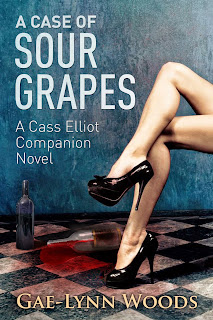%2BDougherty.jpg)
I was lucky enough to be asked by Charles Dougherty (
@clrdougherty) to introduce the main character from my current novel. Charles is probably best known for the
Bluewater Thriller series, but my favorite book of his is a mystery called
DECEPTION IN SAVANNAH. It has a great cast of characters and is loaded with a twisty plot that will have you laughing and dying to know who done it.
Be sure to meet the main characters from the Bluewater Thriller series on Charles' blog (
click here), and at the end of this post, I'll introduce you to two new authors, so keep reading!
One of the things I love about writing a series is that I never know where the characters will take me. People often assume that my characters are an amalgamation of people I've known with a smidge of my personality thrown in, but this is rarely true. So far, my characters have arisen from the imaginary world I've created, Forney County, to fill a necessary role in the story. We need an insecure sheriff, and hey presto, Bill Hoffner is born and matures through the books. Characters rarely arrive fully loaded with an intact history; instead, I have the pleasure of learning about them as the stories, and then the series, unfolds.
Today I'm introducing a character who made herself known in the second Cass Elliot crime novel,
AVENGERS OF BLOOD. Maxine Leverman appeared about halfway through the book, and once I finished writing, she wouldn't leave my head. So I decided to try and write her out of it. Will it work? She's turning out to be a persistent gal and I suspect she'll end up having a series of her own, but only time will tell.
Who is Maxine Leverman?
Maxine was born in 1985, the same year as Cass, which makes them both 26 in 2011, the year the first two Cass Elliot novels and Maxine's first book begin. She and Cass have known each other since childhood and in Maxine's words:
Cass Elliot is my best friend. Has been since, well, maybe not since before dirt, but certainly since we were eating dirt. Usually at her house. Mud pies tasted better there, probably thanks to something toxic in the soil.
Maxine married young and divorced her hedge fund managing husband after realizing he was a cross-dresser. She's making him pay for his love of lingerie, literally, and has no need of a job. On a weekend out partying after her divorce, she was drugged, raped, and marked with a scar that runs from her collar bone to beneath her breast. She and Cass lost touch during "the hedge fund years", but Maxine finally came to Cass in AVENGERS OF BLOOD, seeking help in finding the man who attacked her. She discovered that Cass has a similar scar on her chest; it seems they've been raped by the same man, although years apart.
After Cass is shot in AVENGERS OF BLOOD, Maxine decides to become a private investigator to work with Cass in finding and stopping their rapist.
When and where is the story set?
Maxine's first novel moves between the very fictional Arcadia located in Forney County in East Texas, and the very real Dallas, Texas. Maxine was born and raised in Arcadia but finds that even though she needs to come home to be closer to Cass, she can't leave her big city life behind. Thankfully, she has enough dirt on the cross-dressing ex-husband to fund comfortable homes in both locations.
The book is set in 2011, the year of Texas' worst drought in nearly a century. If you've read the Cass Elliot crime novels, you'll recognize many of the characters who turn up in Maxine's story. In a place as small as Arcadia, we're bound to bump into the same people now and again. But you'll also meet a host of new characters relevant to Maxine's life and this mystery.
What defines Maxine?
Maxine is ferociously headstrong and independent. Her father adored her but
valued her older brother because he was the male child and therefore the heir to their family's oilfield business. She found herself competing for their father's recognition until his death when she was twelve. During their childhood and into their adult lives, their mother was absorbed in competing with her husband by building a successful custom furniture business.
This lack of attention and love drove Maxine into the bosom of the dysfunctional Elliot family. She spent much of her childhood in Cass's home, simply accepted as another of the many children racing through the house.
Maxine is defined by her gender, or more specifically by her father's belief that while girls are special, boys are worthy. Marriage to the hedge fund manager introduced her to power and money on a massive scale, and while she's more than financially secure thanks to his love of silk panties and the trust fund her father left her, she needs to build her own life, to find a path that allows her to be taken seriously. She's decided that the road to credibility lies in becoming a private investigator and working at the Lost and Found Detective Agency with her aunts, Kay and Babby, and her cousin Cindy.
What is the main conflict? What messes up her life?
Maxine is mouthy, impetuous, and overtly sexy. She's fully capable of messing up her own life, although circumstances outside her control have contrived to kick her occasionally. She surreptitiously takes a case on her first day at Lost and Found and decides to work it herself, assuming that finding a missing husband is a no-brainer. After all, she's had a husband, hasn't she? How hard can it be to find one that's gone astray?
From that decision, things go from bad to worse. When the aunts find out, Kay makes up her mind to fire Maxine for working without a PI license, and Babby only manages to save her by promising that Maxine will work under her supervision. Chastised, Maxine accepts the help of her aunts and cousin and finds the husband, but also discovers that his life is a tangled web of lies. The deeper she digs, the more secrets she discovers and the harder it is for Maxine to let go of a case she's already solved. When people start dying, she doesn't believe the police have arrested the right murderer and pushes her aunts, her cousin, and Cass to help her find the truth.
What drives Maxine?
When she started working at Lost and Found, Maxine's sole goal was to use their resources to find her rapist. But as she's worked the case of the missing husband, she's found that she enjoys investigations and that her passion for seeing things to completion (or her hardheadedness, depending who you ask) is a benefit that can drive her to succeed. More importantly, she's discovered that the truth, and finding it, matters greatly to her.
Is there a working title for this novel?
Nope, no title yet.
When can we expect the book to be published?
Follow me on Twitter (
@gaelynnwoods) or Facebook (
https://www.facebook.com/gaelynn.woods) for news about this release and upcoming Cass Elliot novels.
________________________________________________
And now I'd like to introduce you to two fabulous authors that I've read and enjoyed, Dana Griffin and Sinclair Macleod. Check their blogs in the next week or so for introductions to one of their characters.

Dana Griffin (
dana-griffin.com) writes high intensity airline thrillers. Yes, thrillers about airplanes. His first two books are
THE COVER-UP and
COERCED, and Dana knows what he's talking about. He's been a pilot for 25 years, the last 15 of those with major airlines. All this experience gives his books a reality that makes for a wild, conspiracy-filled ride. You can find him on Twitter at
@DanaGriffin97.

Sinclair Macleod (
sinclairmacleod.blogspot.com) lives in Glasgow and writes
THE RELUCTANT DETECTIVE mystery series starring Craig Campbell, a Glaswegian insurance investigator pressed into finding out who murdered a young boy. Sinclair has a way with characters, giving you a sense that these are real people who live and breathe. He draws you into the seedy underside of life, but manages to leave you with a bit of hope for humanity no matter how depraved we may seem. You can find him on Twitter at
@sinclairmacleod.
 Join fellow East Texas author Vivra Beene and myself on Friday night, June 26 at MoJoe's Coffee Cafe in downtown Henderson, Texas. We'll be signing books, reading a few passages, and enjoying live jazz by guitarist Martyn Popey. (You want to hear Vivra read. She's Welsh. Her paranormal stories are spooky. Enough said. And you want to hear Martyn play. He's phenomenal. And my husband. Enough said.)
Join fellow East Texas author Vivra Beene and myself on Friday night, June 26 at MoJoe's Coffee Cafe in downtown Henderson, Texas. We'll be signing books, reading a few passages, and enjoying live jazz by guitarist Martyn Popey. (You want to hear Vivra read. She's Welsh. Her paranormal stories are spooky. Enough said. And you want to hear Martyn play. He's phenomenal. And my husband. Enough said.)






















%2BDougherty.jpg)








